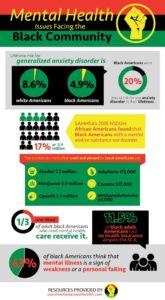According to the World Health Organization (WHO), one in four people will struggle with a mental illness at some point during their lives. However, not every racial group is equally impacted. Racism has a profound, deleterious impact on the mental health of African Americans. The Centers for Disease Control (CDC) has declared racism a serious threat to public health. In the African-American community, mental health issues are often compounded by the psychological stress of systemic racism. As a result, African Americans are 20 percent more likely to report serious psychological distress than Whites, and just one in three African Americans who struggle with mental health issues will not receive appropriate treatment.
The traumatic experience of racism includes overt acts of physical and verbal aggression, but they also include indirect stressors, such as witnessing instances of police brutality on social media or enduring subtle yet harmful microaggressions. These insidious forms of racial trauma perpetuate stereotypes and prejudices, leaving an indelible mark on one’s sense of self ultimately influencing their mental well-being.
Racism also appears in the less obvious, but no less traumatic manifestation of micro aggressions– subtle, often unintentional slights that reinforce racial bias and animus. Examples range from a store clerk persistently shadowing a Black customer to a person of color being mistakenly assumed to be a service worker. Due to their frequency, these microaggressions can gradually erode a person’s sense of self-worth and identity, exacerbating the mental health burden borne by African Americans and members of other marginalized communities.
Racial trauma can also be passed down through intergenerational transmission. Stress can cause changes to reproductive cells as well as to the uterine environment where a fetus develops. Because of this, people whose ancestors experienced trauma may be more vulnerable to mental health conditions. This has tremendous mental health implications for descendants of Black people. Traumatic experiences of racism include physical and verbal attacks, while indirect stressors include seeing videos of police brutality on social media or being the target of subtle putdowns.
At Chrysalis Lab, we recognize that racism/white supremacy are unhealthy mental constructs. That’s why, through our equity work, we encourage leaders and influencers to adopt an introspective approach. We recognize that before any individual can exhibit racist behavior, they must harbor biased thoughts, assumptions, and predispositions about others. By challenging and dismantling these erroneous beliefs, we aim to foster positive, inclusive behaviors and empower individuals and organizations to transcend cultural biases, thereby contributing to a more just and equitable society.

- Music –the Soul of the Movement Past, Present and Future - June 11, 2024
- Black History Month - February 9, 2024
- Voting is King - January 15, 2024
The Power of the Small
December 5, 2024
December 5th marks the anniversary of the Montgomery Bus Boycott, which served as the springboard for the Civil Rights Era. In 1955, the…
Project 2025: The Death of Democracy
July 18, 2024
"Believe people when they tell you who they are. They know themselves better than you." Maya Angelou Project 2025 is not just a policy…